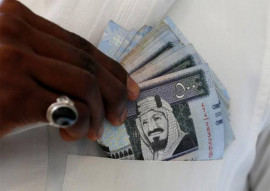
It does not come without warning, but the nearly 21% increase in power tariffs that the National Electric Power Regulatory Authority (Nepra) approved on Tuesday is likely to be unwelcome amongst consumers of electricity who only last month went through another 39% increase in electricity rates.
The increase came after Nepra approved four petitions filed by the state-owned Central Power Purchasing Agency, a subsidiary of the state-owned National Transmission and Dispatch Company. The CPPA claimed that its fuel costs for the month of October 2011 through January 2012 were far higher than those it was allowed to bill and so it must increase the tariffs in order to recover the costs it has already paid to power generation companies.
For the month of October 2011, CPPA says that it faced an average fuel cost of Rs6.95 per kilowatt-hour of electricity purchased but was collecting only Rs4.71 per unit in tariffs, leaving a difference of Rs2.24 per unit. During November 2011, that number came out to Rs1.30 per unit. For December 2011, the differential was Rs0.99 per unit and in January 2012 that number was Rs1.96 per unit.
As with previous decisions, the government is expected to allow no change in power tariffs for ‘lifeline consumers.’
Customers of state-owned Peshawar Electric Supply Company will not undergo the price increase because a case is still pending in the Peshawar High Court against electricity tariff increase. And since the increase only affects customers of state-owned power distribution companies, power users in Karachi – served by the privately owned KESC – will not be affected.
The regulator allowed the increase for the next four months in a decision on Tuesday during a public hearing headed by Nepra Vice Chairman Ghayasuddin, and did so despite vociferous opposition from consumer lobbying groups.
“How will industrialists pay for power tariffs when they have already set prices based on the production costs using the previous electricity rates,” said one of the lawyers representing industrial consumers.
Shaukat Ali Kundi, a member of the Nepra panel that makes decisions on power tariffs, once again wrote a dissenting note, arguing that the state-owned power companies had far too many inefficiencies that needed to be overcome before any tariff hikes for consumers could be justified.
“One of our roles is to protect consumers and therefore the power sector should remove inefficiencies [before requesting tariff hikes],” he said.
Published in The Express Tribune, March 21st, 2012.
COMMENTS (12)
Comments are moderated and generally will be posted if they are on-topic and not abusive.
For more information, please see our Comments FAQ






1732882586-0/Express-Tribune-(7)1732882586-0-270x192.webp)










Fruits of Peoples' Government a.k.a "Roti, Kapda, Makaan" (deprived of)
@DevilHunterX: A democracy's failing has nothing to do with the concept of it. It's a reflection of the people using it.
All lifetime consumer have no effect, like the establishment, bureaucrats and politicians are lifetime because they don't pay their bills. We pay theirs through our taxes. Can someone tell me how you connect to a corrupt meter-reader. I would like do that now.
@Yaida: what about their railway and respect for courts?
With rise of prices every month, all non-politician, non-senior government officers, non-armed forces person will fall in the "lifeline consumers" category soon.
Democracy really is the best revenge ... for common sense.
Power tariff in Pakistan is still the cheapest in the region if you take into account the value of the Pakistani rupee. It is much more expensive in India. Remember that their currency is of higher value against the dollar.
Congratulations the whole nation on this the greatest ever achievement of PPP's government to decrease and curtail the nation's problem and difficulty in this regard. Now this is my humble request and appeal before the nation that please elect PPP once again in the next general elections so that PPP's leaders could raise more and more the power tariffs and more and more disobey the Supreme Court's decisions and so that you "the nation" could sell your precious things to pay the electricity bills on monthly basis in the next PPP's regime. PPP's leadership must be given "Nishan-e-Haider" on this the greatest ever achievement.
Someone should give just 10% of whatever he plundered and still it will be feasible for him :)
This was expected. What do you think cost of RPP was?. People milked money off from RPP now citizens have to pay
This will make importing from India even cheaper.
Yoo hoo Great news